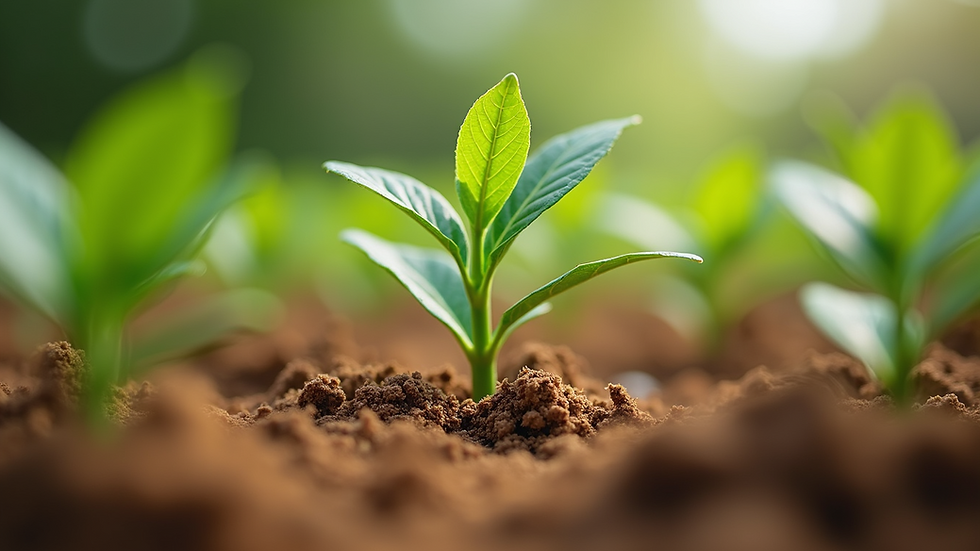How Coco Coir is Made and Its Benefits
- Zira Coir Industry

- Jun 24
- 4 min read
Coco coir has gained immense popularity in recent years, especially among gardeners, eco-friendly enthusiasts, and even construction industries. This natural fiber has unique properties and benefits, making it a favored choice across various applications. In this blog post, we are going to explore what coco coir is, how it's made, and the incredible benefits it provides.
What is Coco Coir?
Coco coir is a natural fiber extracted from the husk of coconuts. These husks, often discarded as waste, are rich in cellulose and lignin, making them strong and durable. The process of harvesting this fiber involves soaking the coconut husks and then separating the inner fibers, resulting in a versatile product utilized in gardening, horticulture, and more.

In addition to the gardening world, coco coir is increasingly being used in various industries such as textiles, bio-composites, and even as a component in eco-friendly building materials. Its versatility stems from its sustainable production processes and adaptability in various environments.
How is Coco Coir Made?
The making of coco coir involves several steps that ensure the fibers are extracted in an eco-friendly manner. Below, we've broken down the process:
Harvesting: The journey begins in tropical regions where coconuts are grown. Once the coconuts are harvested for their meat and water, the outer husks are collected.
Soaking: The husks undergo a soaking process, either in fresh or saltwater. This softens the fibers and loosens them from their matrices.
Extraction: After soaking, the fibers are manually or mechanically extracted from the husks. This can be done using various tools and techniques to ensure the maximum amount of fiber is retrieved.
Washing and Drying: The extracted fibers are washed thoroughly to remove impurities and then dried in the sun. This natural drying process ensures that the fibers retain their integrity and durability.
Processing: Finally, the dried coir is processed into various forms. It can be shredded, finely sifted, or compressed into bricks or blocks, making it suitable for different applications.

Through these steps, the product not only becomes usable but also aligns well with sustainable practices and eco-friendly initiatives.
Benefits of Using Coco Coir
Coco coir boasts numerous advantages that make it a preferred choice for many. Here are some significant benefits:
1. Eco-Friendly Material
One of the standout features of coco coir is its eco-friendly nature. Unlike synthetic materials, coco coir is biodegradable and renewable. By using coco coir, you're helping to reduce plastic waste and dependency on non-renewable resources.
2. Excellent Water Retention
Coco coir has remarkable water retention capabilities. It can hold moisture up to 10 times its weight, reducing the need for frequent watering. This benefit is particularly valuable for gardeners and farmers, allowing them to conserve water and keep plants hydrated.
3. Enhanced Aeration and Drainage
In addition to water retention, coco coir supports excellent aeration. The fibrous structure ensures that air flows freely through the soil, promoting healthy root growth. This property also enhances drainage, which prevents the roots from sitting in stagnant water, reducing the risk of rot.
4. Natural Pest Resistance
Coco coir is known for its natural pest-resistant properties. Unlike soil, which can harbor pests and diseases, coco coir provides a clean and sterile growing medium. This makes it an excellent choice for gardeners looking to maintain a healthy garden without the use of chemicals.
5. Suitable for All Types of Plants
From houseplants to crops, coco coir is suitable for a wide variety of plants. This versatility is appealing to both home gardeners and commercial growers. The balanced pH of coco coir also makes it suitable for acid-loving plants like blueberries.

Applications of Coco Coir
The versatility of coco coir has led to its adoption across various domains. Here are some notable applications:
1. Gardening and Horticulture
Coco coir is widely used as a growing medium for plants and vegetables. It actively supports young seedlings and offers a consistent environment for growth. Its water retention and aeration properties make it ideal for potting mixes and hydroponics.
2. Erosion Control
Since coco coir is biodegradable, it has been effectively used in erosion control measures. Coir mats and logs can be placed to stabilize soil and prevent erosion in landscapes, hillsides, and riverbanks.
3. Mulch Replacement
In landscaping, coco coir can serve as an excellent alternative to traditional mulch. It helps in moisture retention, temperature regulation, and weed suppression, giving plants a better chance to thrive.
4. Bio-Composites
Coir fibers are being used in the production of bio-composite materials. These materials combine the fibrous coco coir with other biodegradable substances to create stronger and lighter alternatives to conventional materials.
5. Eco-Friendly Packaging
With the rise in demand for sustainable packaging, coco coir is being transformed into packaging materials. It’s biodegradable and poses less risk to the environment compared to plastic and other non-eco-friendly options.
Why Choose a Reliable Coco Coir Manufacturer?
When sourcing coco coir, it’s crucial to choose a reliable supplier. A reputable coco coir manufacturer ensures that the product meets quality standards, ethically sourced, and properly processed. High-quality coco coir is free from contaminants and has consistent moisture retention and pH levels.
Features to Look For in a Coco Coir Supplier
Sustainability Practices: Ensure that the manufacturer follows eco-friendly practices in sourcing and production.
Quality Control: Look for suppliers that conduct rigorous quality checks to provide a high-quality product.
Variety of Products: A good supplier should offer a range of coco coir products, from bricks to loose fibers, to meet your specific needs.
Customer Support: Effective communication and customer service are essential for solving any issues that may arise during your purchase.
Final Thoughts on Coco Coir
Coco coir is not just an eco-friendly option, but a versatile solution that meets a variety of needs in gardening, architecture, and sustainable practices. Its strength, water-retention capabilities, and natural properties make it an invaluable resource. By opting for coco coir, you're not only benefiting your plants but also supporting environmentally low-impact practices.
In summary, if you’re considering a sustainable shift in your gardening practices or seeking eco-friendly materials for various applications, coco coir is undoubtedly worth considering. With its numerous benefits and versatile applications, it's time to embrace this natural fiber for a healthier, greener planet.




Comments